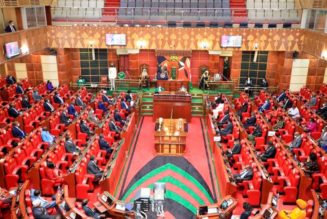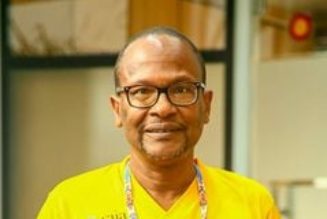Fashion
We Are NBO: From Kibera to the Paris Fashion Week
Wednesday April 05 2023
Shekinah Imani, a model showcases earrings made by Michael Ngathu the founder of the accessories brand “We Are NBO”. FILE PHOTO | POOL
Grazing one of the Big Four global fashion events is every designer’s dream. Michael Ngathu hit that enviable milestone this year with accessories from Kibera, one of the places least associated with high end fashion.
The 29- year-old founder of accessories brand We are NBO showcased his fine handmade jewellery during the Paris Fashion Week that ran from February 27 to March 7, 2023.
He shared the stage with world-renown brands such as Bulgari, Louis Vuitton and Coperni.
How did he get to the great stage?
Last year Michael was shortlisted for a Fashion Accelerator Programme hosted by CANEX (Creative Africa Nexus) sponsored by Afrexim Bank (Africa Export-Import Bank) and in partnership with Paris Fashion Week.
But his journey had started much earlier when he founded We Are NBO in 2019 and started making pieces that caught the attention of fashion lovers.
After graduating from the University of Nairobi with a Fashion degree, he says he applied for jobs as a design or textiles assistant. But he only managed to secure jobs with international brands based in Kenya in their Accessories division.
He soon discovered that he was good at it and decided to pivot to become a jewellery designer which he says he has now grown to love.
Michael describes himself as a creative who is conscious about justice and inclusive systems especially whilst working with his skilled artisans.
He sat with BDLife to share his experiences so far and the vision he has for his brand.
What is the DNA of your brand?
Our artisans who often come from marginalised backgrounds are talented and highly skilled. We use heritage crafts to make contemporary, covetable jewellery.
They creatively upcycle their tools, using reworked water pumps as sanding benches and denim off-cuts as buffing wheels.
We work with mostly recycled and upcycled tools and materials salvaged from the waste stream.
Adhel Bol, a model showcases earrings made by Michael Ngathu the founder of the accessories brand “We Are NBO”. FILE PHOTO | POOL
We consider our pieces to be a dialogue between the artisan and me, the Design Director as I have levered my experience working for international brands to create organic, felt jewellery pieces that tell a story of joy, resilience, community and ingenuity.
Does the Kenyan market appreciate jewellery and are they willing to pay for your products?
Yes, there is a deep appreciation for our pieces. It helps that the bulk of them are fairly priced, ranging from Sh1,000 to Sh9,500 but obviously in the international market we add a markup with consideration of taxes and shipping logistics.
What must be done to change the narrative that artisans are poverty-stricken creatives?
I mainly work with five artisans based between Kibera and Ongata Rongai thus we approach this from a post-empowerment narrative; the artisans are already empowered, and they only need work.
We need them more than they need us. They are incredibly talented and ingenious. They are only limited in supplies of tools and materials to create beautiful pieces.
What key skills do artisans need?
They need to have the ability to work within deadlines, make jewellery that is well-finished, and the ability to interpret technical drawings.
What profit margins do you work with to ensure that you have constant cash flows on a monthly basis?
Right now our business is currently in a flux, there are a lot of changes happening internally, therefore we cannot predict what profit margins we need to maintain cash flow- we are at a stage of rapid growth and oftentimes our needs are unpredictable. We are doing a lot of internal reviews to fix that.
Nyariek Wiyual, a model showcases earrings made by Michael Ngathu the founder of the accessories brand “We Are NBO”. FILE PHOTO | POOL
Do you import raw materials?
We import non-precious stones and beads and chains from America.
How can the government support local artisans?
There needs to be an association for artisans that sets standards and prices for services. Also, investment in training and equipment for the artisans.
Which African jewellery brand would you love to collaborate with for a collection?
Actually, I would love to collaborate with African clothing brands to interpret their collections. I would love to collaborate with Abiola Olusola from Nigeria, she has such a sense of quiet luxury and feminine strength.









